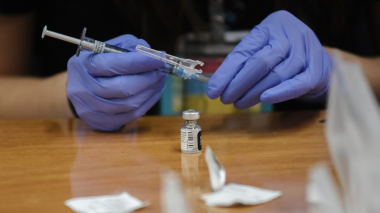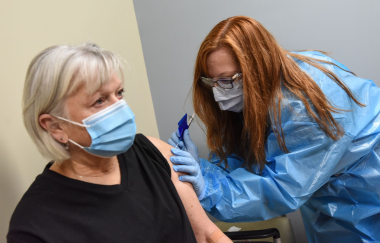When it comes to COVID-19, you may think that it will never affect you or someone you love.
If you’re young and healthy, you may not be concerned about the long-term risks. Or you may have heard that the virus is just like a cold that you’ll get over easily.
The truth is that 86% of adult COVID-19 patients are ages 18-64, so it’s affecting many in our community. As the COVID-19 surge continues, Atrium Health has a record-breaking number of patients in the intensive care unit (ICU) and on ventilators. An unfortunate and consistent trend has emerged in recent months: 98% of COVID-19 patients on life support at Atrium Health remain unvaccinated.
With the abundance of misinformation online, it’s important to base your healthcare decisions on facts and real-world experiences from medical professionals. To help educate our community, we interviewed several Atrium Health experts who work at Atrium Health Carolinas Medical Center and who’ve been on the frontlines caring for patients with COVID-19:
- Jaspal Singh, MD, MHA, MHS, FCCP, FCCM, FAASM, pulmonary, critical care and sleep medicine
- Chad Harvey, MHA, BSRT, RRT, RCP, respiratory care service line educator
- Jennifer Cline PT, MS, director of therapy
- Ashley Katkin, BSN, RN, CCRN, clinical supervisor, Medical Intensive Care Unit
Learn what happens to COVID-19 patients on ventilators– the machines often used to care for some of the sickest patients and explore the long-term effects of COVID-19 critical care. Plus, review tips on how to stay healthy and avoid the ICU.
What is involved in intubation?
Dr. Singh: Intubation is something we do all the time for patients who need surgery. To intubate, we basically put a breathing tube down the patient’s throat. Through that breathing tube, we attach them to a ventilator. This machine helps them exchange oxygen and carbon dioxide, supporting their breathing while they're undergoing an operation or any kind of recovery. We do this all the time, and it's actually very safe and effective.
Why is intubation for COVID-19 more difficult?
Dr. Singh: In order to intubate you and put you on a ventilator, we have to sedate you and put you in a coma. Sedation requires medications, which can affect your body in many ways. For short-term use, most patients do pretty well. During long-term use for COVID-19 care, which could be for several weeks or longer, the medications build up in your body and cause all kinds of side effects.
Harvey: Intubation is never like the way you breathe normally. We're pushing air in, and you're breathing it back out. That process is uncomfortable.
What side effects can be caused by the medications given during intubation?
Dr. Singh: As the medications accumulate in the body, they may cause:
- Memory issues
- Problems with weakness
- Major issues with sleeping and wakening
- Discomfort and/or pain
- Constipation
- Intimacy challenges
We often don't even know the patient is experiencing these side effects because we can't communicate with them while they’re intubated. Based on scientific studies, the longer you're on a ventilator (especially for multiple weeks), the lower your chance of a good outcome.
Cline: The situation is similar for someone with cancer. It's not just the cancer that makes you sick. It's the drugs that help treat the cancer that make your hair fall out and your body feel weak. It's the same thing with COVID-19. It's not just the COVID-19 that makes you sick. It's also the medications that we use to keep you alive.
How do respiratory therapists maintain the patient’s airway during intubation?
Harvey: We frequently have to put tubes down the patient’s airway to suction mucus and secretions from the lower airway. But it's not the way you would normally cough stuff up. Since we're basically sucking it out of you, it causes you to cough. In some cases, patients have described the suction process as painful. However, keeping the airway clear is needed to ensure the patient’s ability to breath while on the ventilator.
What are you seeing patients experience at the bedside once they come off the ventilator?
Katkin: Patients often feel very uncomfortable. They may feel pain or discomfort when we have to turn or reposition them in their bed. They're often disoriented because of the medications, so they don't really know what's going on. I've had people come off of the ventilator and tell me that they thought we were hurting or attacking them.
How does intubation affect your ability to move around and care for yourself?
Cline: From a physical therapy standpoint, once you have a tube down your throat, you can't eat anymore. You can't go to the bathroom. You can't bathe yourself. And every single day that you lie in bed, the weakness that you feel keeps increasing.
Right after coming out of intubation, patients often can’t hold their head up. They can't grip or squeeze things because they're so weak. They also tend to have tight muscles in their ankles from lying in bed for so long, making it impossible for them to stand.
Even if you’re only intubated for a week, you're still going to struggle to stand up and walk. You're going to need equipment, like a walker or wheelchair, to help you get around. You're going to need a specialized therapy team to help you recover. You may receive this care at a nursing home, at a rehabilitation facility or from in-home care services.
How does extended intubation affect how patients look?
Katkin: We use FaceTime to connect patients with their loved ones and family members, since they're unable to be with them in person. Families can see the deterioration virtually, noticing that the patient looks older and frailer with time. The longer they’re in the ICU, the sicker they tend to look.
Dr. Singh: Patients who went into the ICU looking young and healthy often come out looking like they've aged 10 or 20 years. They have bruises from all the IVs. They may have different types of catheters which can cause injury. For example, we've seen, penile injury from Foley catheters. We've also seen rectal catheters with ulcers.
If a patient survives the ICU, what struggles might they have when they return home?
Cline: Patients may be so weak from intubation that they start having nerve pain. They have told us that it feels like their body is on fire. Months later, patients can still struggle with breathing, muscle weakness, fatigue, foggy thinking and nerve pain.
Patients often tell us that they feel like they're not the same person they were before they got sick. We call it a new normal. Because recovered patients often can't return to work, depending on their former job, they may feel like the person they were before they got sick isn't there anymore. The hardest part, as a therapist, is trying to help these patients regain their strength and movement. We want them to feel like the person they were before they got sick, but that may be the hardest thing for us to do.
What emotions do you see from COVID-19 patients in the ICU?
Katkin: Loneliness. Your family is unable to be with you and provide support. They can't be there to hold your hand. I think that's the hardest part for the patient. You're basically lying there with all of these machines keeping you alive, and you're all alone.
Cline: A lot of nurses in the ICU tell us that the hardest part of their job is staying with patients while they die. Dying from COVID-19 is a very long, slow and painful process. Unfortunately, this disease process makes it so people die by themselves.
Harvey: Fear. When we’re watching our patients struggle to breathe just before we add the ventilator, they know that the last words they say maybe their last words forever. In those critical moments, I see the fear in people's eyes. It's strong, and it's hard to watch as a clinician.
Dr. Singh: Regret. It’s the emotion that I’ve seen the most in patients, community members, staff and others. If they haven't been vaccinated, they often wonder: “Am I responsible for getting myself sick? Did I get someone else sick?" Many patients never come to terms with those feelings.
What can I do to stay out of the ICU?
Dr. Singh: You can minimize your risk of being in an ICU by taking care of your health. Be sure to boost your immune system by making sure that you're getting enough exercise, sleep and fueling your body with nutritious food and sleep. You should also practice avoiding crowds and poorly ventilated places, wear a mask and practice good hand hygiene.
Of all the preventive measures you can take, vaccination is the most effective. It's the best thing you can do for yourself and your loved ones. And it will help ensure that you don’t have to live with regret.
Where can I get reliable information about COVID-19?
Dr. Singh: Consult your doctor or someone else you trust who has training in science and medicine. You can also visit CDC.gov and AtriumHealth.org for useful, credible and reliable information.
Learn more about the vaccine and where to schedule your vaccination.



